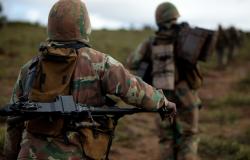Mozambique’s “War on Terror”: Why are Regional Troops Withdrawing?

Manuel Francisco Sambo argues that the SADC’s counterterrorism mission pulled out of Mozambique’s Cabo Delgado province despite violence still raging due to deficiencies in global peace funding, the complex interplay of regional dynamics, and shifting security priorities.
In October 2017, ruthless violence erupted in Mozambique’s northmost province of Cabo Delgado. The violence, which was later considered terrorism, has escalated significantly, presenting a complex and multifaceted challenge to Mozambique’s security and regional stability. The terrorist attacks are carried out by an extremist group (arguably an Islamic State-affiliated faction) known as Ansar al-Sunna, locally referred to as Al-Shabaab. Reports suggest that confrontations between Al-Shabaab and the armed forces have resulted in thousands of casualties among both civilians and combatants. Additionally, it has triggered “one of the fastest-growing displacement crises in the world”, leading to mass displacement as civilians flee in search of safety and refuge.
The ramifications of the Cabo Delgado conflict extend beyond humanitarian concerns, impacting socio-economic development and exacerbating existing vulnerabilities in the province and the country as a whole. Most notably, due to insecurity, in April 2021, the French multinational TotalEnergies declared force majeure and suspended its $20 billion gas project in Cabo Delgado, putting on hold the hope for gas rent windfalls in one of the poorest countries in the world. Why is the Southern Africa Development Community (SADC), which had sent troops to help Mozambique curb the terrorist insurgency, pulling out from the country while the violence rages on? Before answering the question, it is necessary to consider the context in which SADC troops were deployed to Mozambique.
“A Salad of Interventions” in Cabo Delgado
Despite the national, regional, and global concerns over the security situation in Cabo Delgado, Mozambique’s government was initially reluctant to accept international assistance in curbing the violence. The country’s president, Filipe Nyusi, had underscored the “need to know how to manage [all offers], at the risk of creating a salad of interventions in Mozambique.” To compensate for the difficulties of the national security and defence forces in stabilising the province, Mozambique’s government preferred to turn to foreign private military companies (PMC) - the Russian Wagner Group and the South African Dyck Advisory Group - to bolster its security efforts. Nevertheless, much like everywhere else, neither of the PMCs could stop the insurgency; instead, violence in Cabo Delgado continued to escalate and periodically spread to the neighbouring provinces of Niassa and Nampula.
Left with few options, the government eventually sought assistance from foreign states. This included the deployment of Rwandan forces to support counterinsurgency efforts. Ultimately, in response to the persistent pressure that, if not tacked, the violence could spread to the neighbouring countries, Mozambique accepted the deployment of SADC troops, leading to the establishment of the SADC Mission in Mozambique (SAMIM).
SAMIM Establishment
Established on 15 July 2021, SAMIM stands out as an exception in a global context where ad-hoc coalitions increasingly dominate international interventions. SAMIM’s comprehensive mandate includes aiding Mozambique in combatting terrorism and violent extremism in Cabo Delgado Province. It also encompasses the neutralisation of terrorist threats, restoration of security, and establishment of a secure environment in the affected areas. Additionally, the mission seeks to reinforce peace, restore law and order, and provide humanitarian assistance to populations impacted by terrorist activities, including internally displaced persons. Comprising troops from eight Personnel Contributing Countries within the SADC (Angola, Botswana, Democratic Republic of Congo, Lesotho, Malawi, South Africa, United Republic of Tanzania, and Zambia), the SAMIM relies predominantly on South African troops, which provides nearly 1500 troops of the almost 2000 troops deployed.
Deficiencies in Global Peace Funding
SAMIM’s deployment should be understood within broader recent African trends to demonstrate agency and proactive engagement with peace and security issues across the continent. This is evident in a multifaceted approach that can be systematised into four types of interventions. First, the continental-level African Union (AU)-led Peace Support Operations (PSOs) deployed to address conflict situations, such as the African Union Mission in Somalia (AMISOM). The second are the regional operations undertaken by regional economic blocs such as SAMIM and the Economic Community of West African States Mission in The Gambia (ECOMIG). Third are ad-hoc coalitions, such as the Lake Chad Basin region’s Multinational Joint Task Force (MNJTF). Last, consent-based or invited unilateral interventions, such as the Rwandan troops in Mozambique’s Cabo Delgado.
Despite Africa’s proactive role in addressing peace and security issues on the continent, the lack of adequate resources remains a significant and urgent challenge. In its quest for sustainable funding, the AU has advocated for United Nations (UN) assessed contributions for the AUPSOs since 2007. These efforts have involved the African UN Security Council (UNSC) members, the so-called A3, backing resolutions and statements recognising the need for adequate financing for AUPSOs.
In this context, the adoption of UN Security Council Resolution 2719 in December 2023 marks a significant development in the quest for sustainable funding for peace and security on the African continent. This resolution introduces the possibility of UN financing for African Union Peace Support Operations (AUPSO), a crucial step towards enhancing the capacity of regional actors to address conflicts effectively. However, the resolution confines this financial support to missions “under the direct and effective command and control of the African Union.” Consequently, regional operations such as SAMIM (as well as ad-hoc coalitions, bilateral, and unilateral initiatives), which also play pivotal roles in addressing security challenges across Africa, remain outside the scope of UN financing as outlined in this resolution.
Therefore, SAMIM’s withdrawal from Mozambique is primarily attributed to a lack of sustainable funding, which has impeded its ability to carry out its mandate effectively. Despite receiving financial and logistical support from actors such as China and the European Union (EU) via the AU, SAMIM has faced significant challenges in securing sufficient, predictable and sustainable financial resources to sustain its operations. Without consistent and predictable financial support, SAMIM’s capacity to neutralise terrorist threats, restore security, and provide humanitarian relief to affected populations has been severely compromised. In this sense, the mission’s withdrawal underscores the critical importance of adequate funding for regional peacekeeping and peace enforcement efforts, particularly in complex and protracted conflicts like the insurgency in Mozambique.
Regional Dynamics and Shifting Security Priorities.
The premature withdrawal of SAMIM from Cabo Delgado also reflects the broader regional perspective that the insurgency poses a relatively distant threat compared to pressing domestic security challenges. SADC member states are grappling with critical internal crises. For instance, South Africa is facing severe electricity shortages, while Malawi, Zambia and Zimbabwe declared a state of disaster due to acute food insecurity caused by droughts. These domestic urgent issues demand immediate attention and resources, diverting focus and capacity from addressing the Mozambique insurgency. Consequently, SAMIM’s withdrawal signifies, in a sense, a strategic reallocation of financial resources to tackle more immediate and pressing concerns at home.
Additionally, the decision to pull out troops can be attributed to SADC’s strategic revaluation of regional security priorities. With the escalating conflict in the Democratic Republic of Congo (DRC), characterised by widespread violence and political instability, SADC has deemed it imperative to redirect military resources and attention towards addressing this more severe crisis. With effect, SADC deployed, in December 2024, a military mission to DRC, meaning that given SADC member states’ limited capacity and resources, strategic decisions had to be made to allocate resources where they are most urgently needed.
Finally, Rwanda’s emergence as a prominent actor in securing Cabo Delgado has shifted the dynamics of intervention, with perceptions of more effective coordination between Rwandan forces and local authorities compared to SAMIM’s involvement. This perception has led to a diminishing role for SAMIM as Mozambique’s government increasingly looks to Rwanda for security solutions in Cabo Delgado. In fact, as SAMIM pulls out, Rwanda is set to send additional troops to Cabo Delgado. Furthermore, the concern within the SADC regarding Rwanda’s involvement in fuelling the conflict in DRC, where SADC is actively intervening, may have impacted the political relations and, consequently, the coordination between Rwanda and SAMIM in Cabo Delgado.
In conclusion, SAMIM’s withdrawal from Cabo Delgado reflects multifaceted challenges in regional peace and security operations. These include inadequate and unsustainable funding, competing domestic crises in SADC member states, simultaneous interventions in other conflict zones, notably the DRC, and strained relations with Rwanda. This emphasises the necessity for coordinated and well-resourced multilateral approaches to regional security threats. Such initiatives should prioritise sustainable funding mechanisms and a nuanced understanding of complex conflict dynamics to effectively address challenges like those in Mozambique’s Cabo Delgado province.
Manuel Francisco Sambo is a PhD candidate at the Graduate School of Global Studies, Doshisha University, Japan, and a part-time lecturer at the Department of Global Studies, Kyoto University of Foreign Studies. Sambo’s research and publications focus on peace, security, and development policies in Sab-Saharan Africa.
Image: WikicommonsMedia


